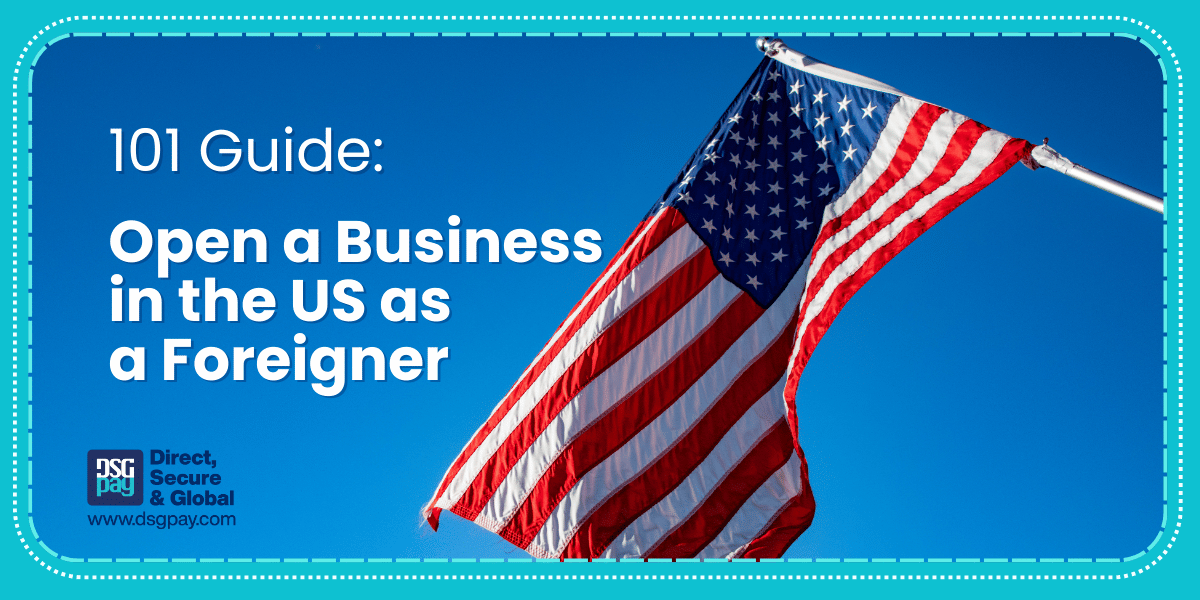Do you want to open a business in the United States but aren’t sure where to begin? To open a business in the US as a foreigner might seem challenging, but it’s more achievable than you think.
With the right information and resources, you can navigate the process and open the opportunities of one of the world’s largest markets.
This guide breaks down the steps, from choosing the right business structure to understanding legal and tax requirements, so you can start your journey with confidence.
Table of Contents
Can I Open a Business in the US as a Foreigner?
Yes, opening a business in the United States as a foreigner is possible and more common than you might think. The US welcomes foreign entrepreneurs to start a business in the US, provided they adhere to the country’s regulations and legal processes.
Whether you want to manage your business remotely from your home country or plan to relocate and take a hands-on approach, there are well-defined steps to follow.
How to Register a Business in the United States
By breaking it down into manageable steps, you can simplify the process and set your business up for success. Here’s a step-by-step guide to help you get started:
1. Choose the Right Business Structure Type
The first decision is selecting the business entity that best fits your needs. As a foreigner, you typically have two primary options:
- Limited Liability Company (LLC): Offers limited liability protection and avoids double taxation since profits are taxed on the owner’s personal income tax return.
- C-Corporation (C-Corp): Ideal for businesses seeking to attract investors or issue stock, though it’s subject to double taxation (corporate and shareholder levels).
Carefully consider factors like liability protection, tax implications, and your long-term goals when choosing a structure.

2. Select the Best State to Open a Business in the US as a Foreigner
The state you register in will determine your legal obligations, tax rates, and filing fees. While some states, like Delaware and Nevada, are popular for their business-friendly regulations, it’s often best to register in the state where you’ll conduct most of your business. For online or remote businesses, you can choose a state with favourable tax policies.
3. Choose a Unique Business Name
Your business name must be unique and compliant with the naming rules of your chosen state. Use the US Patent and Trademark Office (USPTO) database or your state’s business registry to ensure your desired name isn’t already taken.
4. Appoint a Registered Agent
A registered agent is required to receive legal and tax documents on behalf of your business. This can be an individual or a registered agent service. If you’re not physically present in the US, you’ll need to appoint someone based in the state where your business is registered.
5. File the Formation Documents
Submit the necessary documents to officially form your business entity.
- For an LLC: File Articles of Organization
- For a C-Corp: File Articles of Incorporation
These documents include details like your business name, address, registered agent, and management structure. Filing fees vary by state but typically start at $50.
6. Obtain an Employer Identification Number (EIN)
An EIN is essential for hiring employees, opening a US bank account, and fulfilling tax obligations. You can apply for an EIN online through the IRS website or by submitting Form SS-4. If you don’t have a US Social Security Number (SSN), you can still apply by mail or fax.
7. Open a US Business Bank Account
A US bank account is crucial for managing transactions and building credibility. To open an account, you’ll typically need:
- Your EIN
- Formation documents
- Proof of identity
- A physical US address (some banks accept virtual office addresses)
Additionally, many entrepreneurs explore business credit vendors to build a strong credit profile for their new US business. Establishing credit early can help secure better financing terms and improve overall financial flexibility as the business grows.
8. Alternatively, Open an Online Business Account
If you’re looking for a more flexible and cost-effective way to manage your business finances to open a business in the US as a foreigner, consider opening an online business account. Unlike traditional banks, online accounts often come with lower fees, faster setup processes, and greater accessibility. You can handle transactions, receive payments, and manage multiple currencies without being tied to a physical location or dealing with the paperwork and lengthy approval times of traditional banking.
DSGPay provides access to over 30 currencies, including USD, along with competitive exchange rates and real-time transaction tracking. This streamlined approach is designed to support the needs of global business owners, offering a practical option for managing your US business finances efficiently.
9. Comply with Federal, State, and Local Taxes
Understanding your tax obligations is critical. Depending on your business structure and state, you may need to pay:
- Federal income tax
- State income tax
- Sales tax
- Payroll tax (if you have employees)
Consulting a tax professional experienced in US laws is highly recommended.
10. Secure Necessary Licenses and Permits
Depending on your industry and location, you may need specific licenses or permits to operate legally. Check with the Small Business Administration (SBA) or your state’s business office for guidance.

What Visa Do You Need to Open a Business in the US as a Foreigner?
To form and operate an LLC or other business entity in the United States from outside the country, you do not require a visa. Many foreign entrepreneurs choose to manage their US-based businesses remotely, which is entirely permissible under US law. However, if you plan to actively manage your business from within the US, you will likely need a valid visa.
Common Visa Options for Foreign Entrepreneurs
Here are some of the most popular visa options for non-residents looking to start a business in the US:
- E-2 Treaty Investor Visa
- Designed for nationals of countries with a treaty of commerce and navigation with the US.
- Requires a substantial investment in a bona fide US. business.
- Applicant must have at least 50% ownership and actively manage the enterprise.
- L-1 Intracompany Transferee Visa
- For entrepreneurs expanding their existing foreign business to the US.
- Allows transfer of executives, managers, or employees with specialized knowledge to the US office, affiliate, or subsidiary.
- EB-5 Immigrant Investor Visa
- Requires a minimum investment of $1.05 million (or $800,000 in targeted employment areas).
- The investment must create at least 10 full-time jobs for US workers.
- Provides a pathway to permanent residency.
- H-1B Specialty Occupation Visa
- For roles requiring specialized skills, such as tech startups where the entrepreneur serves as an employee.
- Must demonstrate an employer-employee relationship within the business.
- International Entrepreneur Parole (IEP)
- For startup founders who can demonstrate that their business has significant potential for growth, job creation, and innovation.
- Requires ownership of a substantial stake in the company and evidence of US. investment or government funding.

Do You Always Need a Visa to Run a Business in the US?
If your business activities are limited to managing operations from abroad, a visa is not necessary. However, performing duties within the US, such as hiring employees, meeting clients, or overseeing operations on-site, typically requires proper work authorization.
Consult an Immigration Expert
Since visa eligibility and requirements can vary based on individual circumstances, consulting with an immigration attorney can help ensure that you choose the right visa for your business activities and long-term goals.
Get Paid Like a Local in the US: Wherever You Are with DSGPay
More businesses are choosing online business accounts to manage their US operations, and for good reason. They’re faster, cheaper, and much more convenient than traditional banks. DSGPay makes it easy to navigate the financial complexities of operating a business in the US as a foreigner.
Whether you’re sending payments to suppliers, receiving funds from clients, or managing payroll, DSGPay offers a seamless, cost-effective solution to support your business growth. Here’s how DSGPay can support your business:
- Multi-Currency Virtual Accounts: Access over 30 currencies, including USD, for seamless global transactions.
- Competitive Exchange Rates: Save on every transaction with low-cost currency conversions.
- Real-Time Payment Notifications: Stay updated on incoming and outgoing payments instantly.
- Quick and Easy Setup: Skip lengthy processes associated with traditional banks.
- Global Accessibility: Manage payments from anywhere without being tied to a physical location.




